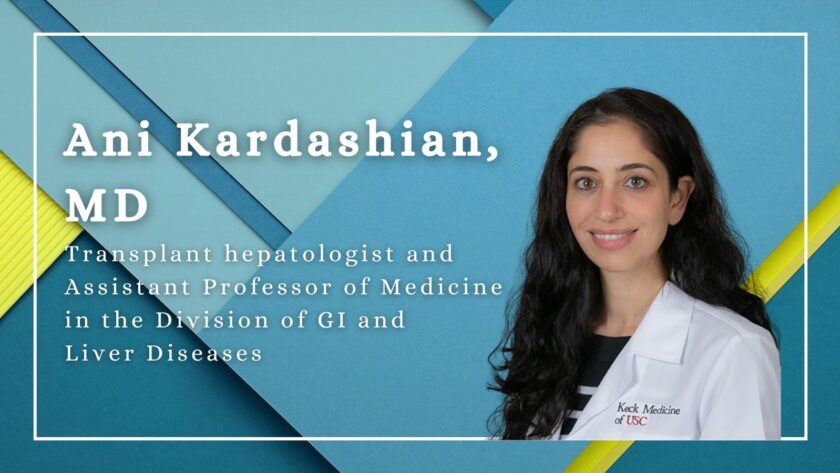A Conversation with Ani Kardashian, MD, recent KL2 awardee
We spoke with Dr. Kardashian about being a recipient of the SC CTSI Mentored Career Development in Clinical and Translational Science award, what got her interested, what her plans are, and what challenges she has faced.

We sat down (virtually) with Ani Kardashian, MD, Transplant hepatologist and Assistant Professor of Medicine in the Division of GI and Liver Diseases, a recipient of the SC CTSI Mentored Career Development in Clinical and Translational Science award. We hear about her experiences as a KL2 Scholar thus far, and what she hopes to learn. We look forward to seeing all that Dr. Kardashian accomplishes in the coming years!
Tell us a little bit about your experience so far in the KL2 program.
I just started the USC KL2 program so I am early into my experience, but thus far I have been thrilled with the opportunities that the KL2 program has provided to me. The program has allowed me to pursue a Master’s degree in Clinical, Biomedical, and Translational Investigations, gain mentorship and pursue interdisciplinary collaboration with experts in departments outside of my own, and has also provided a forum in which to meet other early-career faculty who are also pursuing careers in academic research.
What initially got you interested in starting this program?
The KL2 program is a perfect fit for me. I decided during my gastroenterology fellowship (towards the end of my clinical training) that I loved research. At that point, it was too late to pursue formal training in clinical research methodology during my fellowship. The KL2 has provided me with an opportunity to learn the formal skills required to conduct clinical research with the ultimate goal of applying for an NIH K23 award and eventually an R01 award.
What drove you to specialize in liver disease?
My interest in hepatology began during residency caring for patients with cirrhosis in urban, safety-net hospitals. While the challenges of managing critically ill patients with liver disease fascinated me, the socially complex lives of my patients compelled me to look beyond mechanisms of illness and to learn about the social factors that influenced their health outcomes. Social determinants of health, including poverty, food insecurity, and housing instability, for example, affected my patients’ health long before they even presented for their liver transplant evaluations. Witnessing the influence of these factors in a day-to-day setting sparked my research interest in formally studying the role of food insecurity and other social factors on liver health outcomes. Currently, in my clinical practice, I care for patients with chronic liver disease at our safety-net Los Angeles County hospital and Keck liver transplant center.
Have you run into any challenges or obstacles along the way?
Yes, there are many challenges in pursuing a research career. For example, for every grant acceptance I have received, there have been several other rejections. I am learning that perseverance is key to a career in research.
What does the KL2 program mean to you and how has it furthered your career?
The KL2 program has allowed me to pivot my career goals and embark on the path to becoming a physician scientist. I hope this award is the first step on my path to becoming an independently funded clinical outcomes researcher at the intersection of social determinants of health, food insecurity, and liver disease.
Who else has been an integral part of your success in this program?
My research mentors, Drs. Norah Terrault, Myles Cockburn, and Jennifer Price, have also been integral to my success. They not only guide me as expert advisors for my research agenda but have also provided critical career mentorship and sponsorship for my academic advancement here at USC and more broadly within the national hepatology community.



